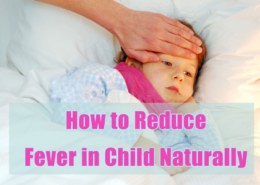How To Reduce A Fever In Children Naturally While Staying At Home
Most parents worry about feverish symptoms and how to reduce a fever in their child naturally especially when there is no medical facility near them. However, measuring temperature is not the best indicator of whether a fever is a cause for concern or not.
As a parent, you should observe how comfortable your child feels.

Mother treating her child from fever through natural measures
If your child has a low temperature and is active, you may not need to intervene at all! However, it is very important to monitor the intake of food and liquid, as well as the nature of urination of a child with fever.
If they are normal, there is no need to panic or rush to the pediatrician. Just watch your child for signs of improvement or change.
However, if your child feels discomfort and the temperature exceeds 104 degrees or persists for two days in a row, it’s time to see a doctor.
How To Reduce A Fever In Children Naturally
The treatments for fever in children are very similar to those for adults. However, there are a few subtle differences.
For example, to treat a fever, children and infants should try:
Drinking plenty of fluids
Like adults, children with a fever also need plenty of fluids. However, it can be difficult to get young children to drink extra water.
Some more appealing alternatives include:
- warm chicken broth
- popsicles
- flavored jello
- diluted fruit juice
Resting
Children may feel better after taking OTC medications. As a result, they may feel more energetic and playful.
However, it is important to ensure that children rest until the fever or illness has passed.
If a child cannot sleep or relax, parents and caregivers can try reading them a story or playing them some gentle music.
Taking warm baths
Children are unlikely to appreciate bathing when they are sick. An alternative option is to place a warm washcloth on the child’s forehead to help soothe the fever.
People should never apply rubbing alcohol to a child’s skin in an attempt to soothe a fever. Alcohol can be dangerous when absorbed into the skin.
Taking OTC medications
As with adults, medication is not usually necessary for a child with fever. However, taking OTC medications can help reduce a fever and make a child feel more comfortable.
One drug that is suitable for children of most ages is acetaminophen. It is available under the brand name Tylenol.
Tylenol’s manufacturers state that it is suitable for use even in very young infants. However, the Food and Drug Administration (FDA) do not supply dosage instructions for acetaminophen in children under 2 years of age.
People who wish to treat a young infant should ask their doctor’s or pharmacist’s advice on appropriate dosages.
Some medications are not suitable for children under certain ages. These include aspirin, which is not suitable for people under 16 years of age, and ibuprofen, which is not suitable for children under 3 months of age or those who weigh under 5 kilograms.
Ibuprofen is also not suitable for children with asthma.
When to see a doctor
People should be sure to see a doctor if they or their child experience a very high or persistent fever that does not respond to medication.
It is also important to seek medical attention if the fever is accompanied by any of the following symptoms:
- stiffness or pain in the neck
- sensitivity to light
- rash
- dehydration
- seizure
These symptoms could indicate a more serious infection, such as meningitis.
The threshold for seeking medical treatment is typically lower for children and infants than it is for adults. In general, people should seek medical treatment for a child who:
- is under 3 months old and has a fever of 100.4°F (38°C) or higher
- is 3–6 months old and has a temperature of 102.2°F (39°C) or higher
- has a fever that has lasted for longer than 5 days
- has other signs of illness, such as a rash
- has symptoms of dehydration, such as sunken eyes, a lack of tears when crying, or nappies that are not very wet
- is not eating and seems generally unwell
Credit:
https://www.medicalnewstoday.com/articles/326925#when-to-see-a-doctor



Leave an answer
You must login or register to add a new answer.